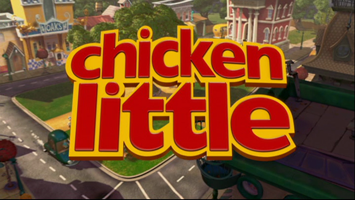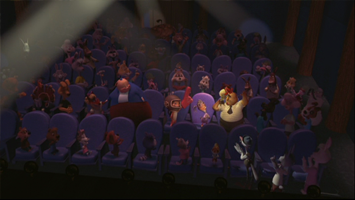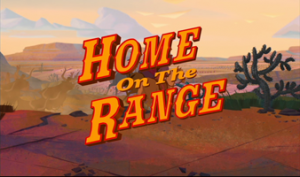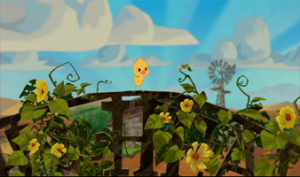written and directed by Jean-Luc Godard
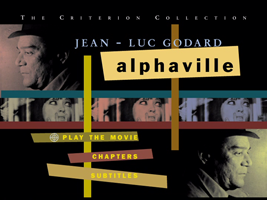
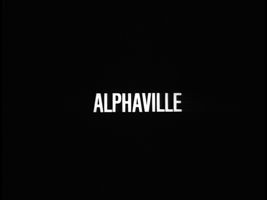
Criterion #25. End of the first page of the listing! (26 pages to go. Having spent 1665 days on the first page, I calculate that getting to the end will take about 119 years. Though of course they’ll probably have released some more movies by then.)
My first actual Godard. But his style is of course familiar from parody. Which it lives up to.
Alphaville is intellectualist through and through. It privileges concepts over things, both in technique and in content. It is, shall we say, not obvious.
In approaching such a work there are two modes of critique: the naive and the like-minded. The negative naive response is “meaningless drivel.” The positive naive response is “stylish dream.” The negative like-minded response is “sophomoric symbolism.” The positive like-minded response is “brilliant allegory.”
(There is actually a hybrid third category: the naive response that believes itself to be like-minded. e.g. the feminist who, of any sufficiently obscure work, readily sees that it is about feminism.)
To attain to a genuinely like-minded response, one either lucks out and finds that one happens to be like-minded, or else one makes an effort to decode. My cynical impression is that lucky sympathy is rare, and most comprehension of high symbolism is not organic but deliberate. That’s not to say that it is false; only that it requires a kind of effort on the part of the audience that it did not require on the part of the creator, who generally arrives at his obscurities by a pleasant flower-gathering in his own personal garden of associations.
You will hear it clucked by admirers of things high that naive responses are not just naive but irresponsible: incurious, philistine, lazy. In this moral system, failure to make the effort to decode is failure to give intellect its due. (These sorts of people are usually frustrated by how little respect their own intellects have been accorded and thus are compelled to act out the values they found lacking in the world: tireless devotion to intellect, disdain for those unwilling to be so devoted. (, he psychoanalyzed sweepingly.))
However not all obscure works are equally obscure, and the community trying to put moral pressure on the world to make the interpretive effort varies in its size from work to work. If you could find the ratio of naive to like-minded responses for a given work (some whiz at Google Ngrams can probably rig that up, right?), and then listed works by ratio, I imagine that a broad spectrum of obscurity would be completely represented, all the way from very obvious children’s books that nobody (of writing or speaking age) has ever thought to blame for causing their incomprehension, to Finnegans Wake, which can be decoded but about which even most professors of literature — professional decoders — will say the effort is a waste of time. Beyond that, a broad swath of amateur poetry and the like, stuff that nobody apart from the author will ever take the time comprehend fully; and then, further beyond, surrealism and other work intended only to be comprehensible naively. And at the far end, random or otherwise depersonalized work.
If the number of works at each ratio were graphed, I suspect you’d see a huge peak at the low end, where most works live (or perhaps just above the low end, since absolute explicitness isn’t actually prized and is probably not possible), and then a downward slope as the works got more obscure. At the far end, where the surrealists et al. live, there would probably be a smaller peak, of works broadly understood to be basically intuitive and abstract.
It’s the middle of the graph that I’d be interested to see, because I’m not entirely sure what it would look like. Does the graph of obscurity taper steadily, or is there a point beyond which adding further obscurity to a work means that the audience willing to make the effort suddenly becomes exponentially smaller? Are there local maxima, customary degrees of obscurity around which works cluster? I really don’t know.
What’s important is that if there did happen to be such bumps and tipping points in the graph, they would reflect demographics, not aesthetics. Or, to put all of this another way, obscurity is in the eye of the beholder, so the only possible objective standard of obscurity is a census of beholders, regardless of whether the distribution is smooth or lumpy.
This needs pointing out because we (I) need an antidote to the shaming of the cluckers, as well as my own internal clucker. When I hear people saying that Moby-Dick is stupid and boring, or that black and white movies are stupid and boring, and that anybody who claims to like them is just posturing, or whatever, I can’t help but think “come on! grow up.” When I hear people saying that I should come on! and grow up! for thinking that, say, Godard is stupid and boring, I can’t help but think, “well, you’re just posturing.”
But because I am capable of self-awareness, then I immediately feel wary. Wait a minute, what am I saying? I don’t want to be caught being a Philistine! That’s not me! Don’t I want to give the intellect its due? Am I really so lazy and self-satisfied that I can’t put in a little extra muscle and figure out what Godard is doing? Come on! Grow up! You might learn something, jerk! Okay, fine. And so I do, priding myself on the effort.
But this is what needs an antidote. It is wrong to look at the graph of obscurity and say that the objective is to encompass it all in like-mindedness, because that is dishonest and impossible. And it is wrong to take the opinions of others as your compass because there will always be voices from just above you saying “come on! grow up! typical American! civilization down the tubes!” Whether or not they are posturing or authentic is beside the point. (Most likely they are not posturing per se, but they have exerted great and strenuous effort to get where they are, an effort that they would rather not acknowledge because it was motivated by having been shamed themselves, he psychoanalyzed sweepingly again.)
The point is this: everyone draws his own line of demarcation somewhere on that graph; everyone has his own ratio and clucks from where he stands. It seems right to me personally that my ratio should privilege like-mindedness and empathy over stubborn incomprehension, but only slightly. I think the golden section would be a good guideline here. So: I deem it morally incumbent upon me to make the effort to decode and comprehend works that are 61.8% obscure or less, and no more. My retort to the cluckers in the regions beyond will be that they have been driven by shame into a life out of balance, beyond the golden mean. As I myself was for a long time.
Alphaville is, I would say, about 70% obscure. Temptingly close to the line, close enough that I can hear it murmuring: come on, kid, you only need to think a little harder to get your gold star!
Well, for the first time in a while, I am braced to shout “Screw you, pusher-man! You don’t know me! PRETENTIOUS DRIVEL! STYLISH DREAM!” This is a moral victory. I am, accordingly, not going to say anything about what this movie is about about.
(Though, ironically, what it’s about is the supremacy of feeling over “logic,” and is thus applicable to this discussion. Seems to me Godard gets it all wrong by being blatantly stuck in a self-regarding intellectual mode himself, not recognizing that as far as art is concerned, his attitude isn’t so far from being in cahoots with his “logical” computer supervillain. Oops, I talked about it. Well, that’s just my hazy view from 9% away, and that’s how it’s going to stay. My toes didn’t go over the line. And I kept this in parentheses!)
Is it a stylish dream, though? Yeah, kinda. It’s “stylish” in the cavalier mode of the Nouvelle Vague, which overlaps significantly with amateurish sloppiness. Is it possible that it is actually just amateur and sloppy? Yeah, kinda. Does this general sloppiness add to or detract from the charm of the more refined compositions that crop up here and there? It depends on your mood. My mood fluctuated.
Here’s what I enjoyed: the feeling of slinking arbitrarily around the bland modern lobbies and corridors of Paris circa 1965, in nocturnal black and white. And I enjoyed that overlaid on that meandering was an easygoing intention to riff on pulp conventions. My favorite part was envying Godard the luxury of actually carrying out his half-baked project, which felt relaxed. It put me in mind of high school days, when some whim and a vague sense of adventure would give rise to long, mysterious nights of pointless driving around. Like American Graffiti. Or Nighthawks. You’re not going to figure out what it means by thinking about it or talking about it.
Which is why this movie didn’t work for me. If you’re going to have that kind of fun with no name, Monsieur Godard, shut up already. Nobody cares about your asinine evil computer story or your speechifying, least of all you, so stop pretending. It’s very clear, as you surely knew it would be, that this movie is really just an framework for a variety of indulgences, not least of which is spending some quality camera-worship time with your ex-wife. You could have had the decency to just follow through on that instead of making it purport to be some kind of well-formed movie with something important to say.
Accordingly the best part of the movie by far is the first 10 minutes, in which a ridiculous succession of noir tropes is strung together deadpan and we don’t yet realize that we’re supposed to take it at all seriously: the trench-coated protagonist drives into town, grimly checks into a hotel, a pretty girl shows him to his room, takes off her clothes, a bad guy emerges from the bathroom and the hero fights him, the hero photographs the girl while she poses for him, the hero shows off his marksmanship by using a magazine centerfold as target and firing two bullets through the breasts without looking, while reading a copy of “The Big Sleep.” All of this to wonderfully overcooked noir-in-quotes music by Paul Misraki. I was delighted. I thought I was going to be delighted by the rest. But the rules aren’t what I thought. One is expected to follow along and care. Nope.
To the degree that the movie is fun, it’s because the music shows us how. Here comes your sample. For the first time I’ve done a bit of editing. Reluctantly, but I had to. Godard, not content to let any of his borrowed tropes run for too long without aggressive conceptual interference, edits the music with raw, amateurish stop-and-go cuts, and there’s not a single major cue in the whole movie that he uses in its entirety without overlay of dialogue. However, the same piece of music is used over and over. So what I’m offering here is a splicing together of the uninterrupted bits of music from the first 2 minutes of the movie to form a continuous excerpt that constitutes more or less the main material of the score. The two splices, which hopefully are unobtrusive, correspond exactly to reuse of the same section of composition, so I haven’t done anything invasive to the music itself – this is really how it goes, and it’s all audio from the movie. That’s the disclaimer. Do listen, because this is good stuff: Track 25.
The casual, no-budget visuals juxtaposed with this outsize orchestral sturm und drang reminded me of my absurdist adolescent video projects, which would set undistinguished Video8 footage of my friends strolling around the suburbs to intense movie music. Which always struck me as hilarious, because it almost starts to work! and then your brain suddenly gives up because it’s just too stupid. There’s some kind of joy in that exhaustion, renewing and intensifying one’s awareness of silliness. Those charms are almost the charms of Alphaville, and how fond I was when I found them there! Alas, too seldom.
